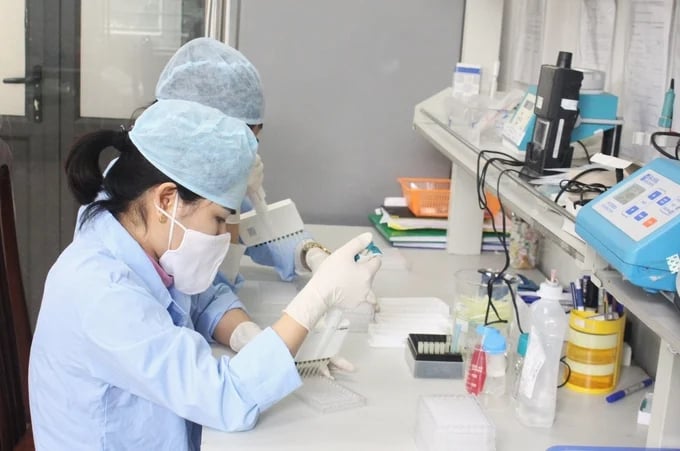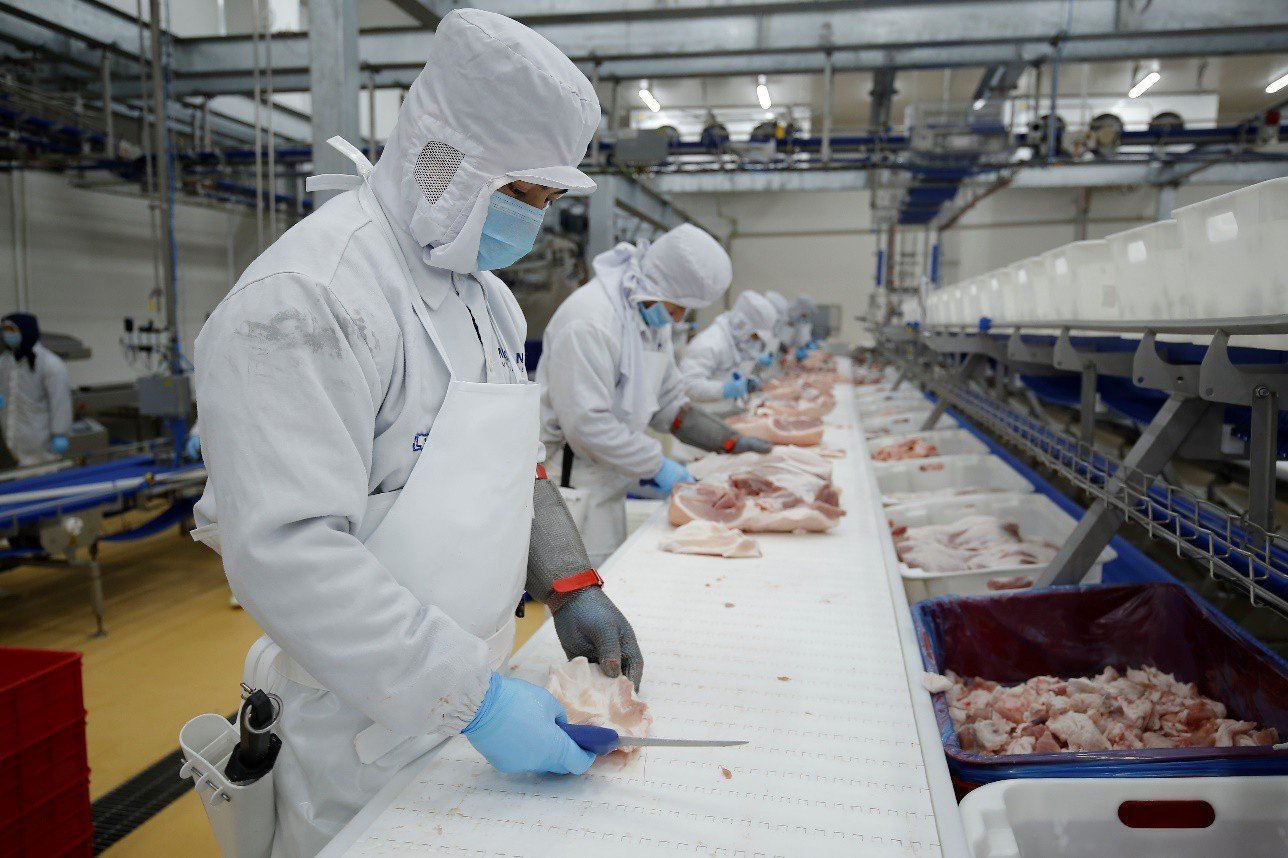November 19, 2025 | 19:25 GMT +7
November 19, 2025 | 19:25 GMT +7
Hotline: 0913.378.918
November 19, 2025 | 19:25 GMT +7
Hotline: 0913.378.918
On April 3, at the Conference on “Disease prevention and pig farming development in the new situation” organized by the Ministry of Agriculture and Environment, Nguyen Van Tue, Deputy General Director of Dabaco Group Vietnam Joint Stock Company, said, “In line with the country's development trend towards industrialization and modernization, and grasping the path of reducing small-scale livestock farming, Dabaco has focused on increasing and developing herds in a sustainable direction.”
From the perspective of the Dabaco Deputy General Director, the first factor ensuring sustainability is the modern barn system. Dabaco uses completely imported barns, meeting the requirements of productivity and disease safety. Dabaco's total current sow herd size and pig herd are approximately 60,000 and 700,000 respectively.

Representative of the Vietnam Veterinary Association (Vietnam Union of Science and Technology Associations - VUSTA) proposed a strong increase in funding for veterinary research. Photo: Trung Quan.
Regarding breeding stock, Dabaco imports foreign breeds to take advantage of high-yield gene pools, then selects and propagates them purely. In the field of animal feed production, Dabaco expects to reach an output of 1 million tons by the end of this year, both supplying the market and being self-sufficient in feed sources for its farm system. The company continuously improves nutritional formulas to optimize livestock farming efficiency and reduce the feed conversion ratio (FCR).
“Only when productivity is improved can costs be reduced, thereby increasing the competitiveness of the product,” said Deputy General Director Nguyen Van Tue.
Facing the complicated developments of African swine fever, Dabaco gives special priority to biosecurity solutions, considering this the number one factor. All livestock are fully vaccinated according to strict procedures.
Livestock production on a large scale without good control will result in severe contamination, so Dabaco has heavily invested in developing a circular production model on farms, ensuring no emissions into the environment. This is Dabaco's commitment to creating consensus with the people, reducing pressure on local authorities and maintaining stability in production.
According to Nguyen Xuan Duong, Director of Animal Husbandry Association of Vietnam (AHAV), the demand for pork in the market remains high, but there is a gradual shift to other meat such as poultry and aquatic products. The pig farming industry continues to face great pressures, including disease, livestock production costs and increasingly stringent environmental protection requirements.
In order for the domestic pig farming industry to develop in a sustainable direction, Director Duong proposed that state agencies responsible for the management of livestock and veterinary medicine need to conduct a comprehensive assessment of livestock farming activities from many perspectives. It is crucial to reorganize the production chain, maintaining too many chains is unnecessary, but the veterinary forces should strictly control the entire chain to create synchronization.

The pig farming industry has its focus on the research on “cooling” pig slaughtering technology to gradually change people's habits and increase the competitiveness of pork products. Photo: Hong Tham.
Another approach is to promote the application of modern technology in livestock farming, especially artificial intelligence (AI) to improve productivity, minimize risks and optimize management. The industry needs to call for the participation of the State and the whole society in disease control work, and disease prevention must be considered the key to the development of pig farming.
On the other hand, the focus should be on removing obstacles in the work of controlling slaughter. If the state agencies do not point out a clear direction, it will be difficult to control food safety and disease safety. The research on "cooling" pig slaughter technology requires further attention in order to gradually change people's consumption habits and increase the competitiveness of pork products.
Nguyen Thi Huong, President of the Vietnam Veterinary Association (VUSTA), expressed concern about the fact that funding for veterinary research is still too limited. Meanwhile, every time an epidemic occurs, the cost of dealing with the consequences is extremely high, not to mention the serious impacts on human health and community safety.
“We need to proactively increase funding for veterinary research. This is a practical way to affirm the principle of ‘prevention is better than cure’ and contribute to protecting the livestock industry in a sustainable and effective way,” said President Nguyen Thi Huong.
Translated by Samuel Pham

(VAN) Viet Nam’s entry into the ACF Alliance expands opportunities for agricultural innovation, knowledge exchange, and deeper international cooperation.

(VAN) Vietnam remains committed to sustainable development, maintaining a harmonious balance among economic growth, environmental protection, and climate-change response.

(VAN) Deputy Prime Minister Tran Hong Ha convened a meeting with the MAE and relevant agencies to discuss the draft decree on national multidimensional poverty standards for the 2026 - 2030 period.

(VAN) The year 2025 marks the 10th anniversary since more than 190 countries adopted the Paris Agreement on climate change, paving the way for strengthened global action.

(VAN) The PepsiCo Foundation funded the project ‘New Harvest: Sustainable Agriculture Initiative’, focusing on regenerative agriculture and climate change.

(VAN) Dr. Nguyen Viet Hung, ILRI's Regional Director for Asia, emphasized the One Health approach in ensuring food safety and reducing antimicrobial resistance risks in livestock.

(VAN) The youth-driven initiative ‘Innovate for water, act for the future’ seeks practical, scalable solutions to Vietnam’s water challenges.